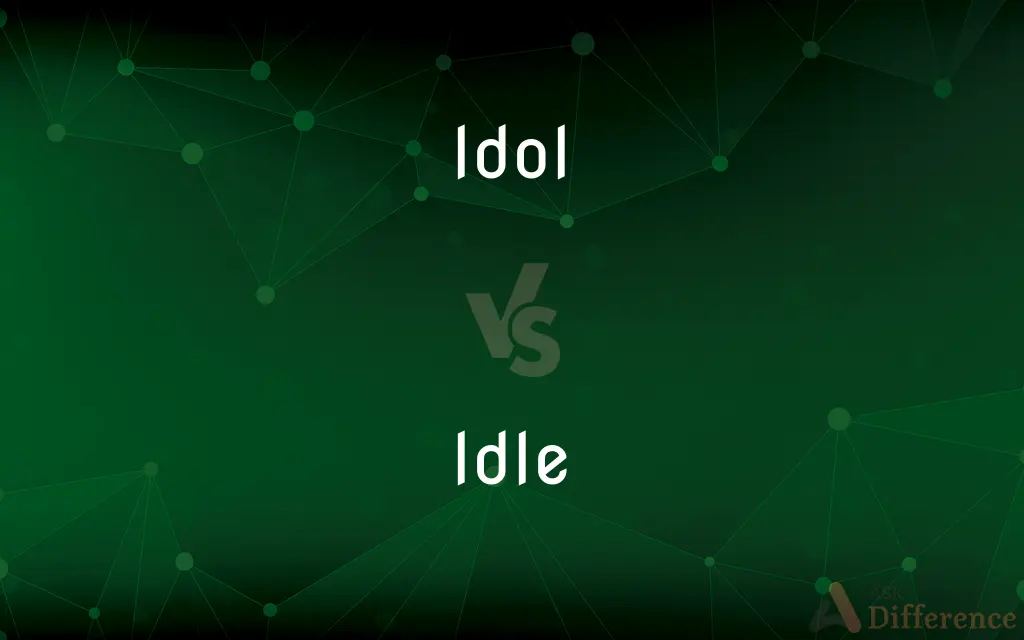Idol vs. Idle — What's the Difference?
By Tayyaba Rehman & Fiza Rafique — Updated on March 9, 2024
An idol is an object of worship or admiration, often representing a deity, while idle refers to a state of inactivity or not being in use.

Difference Between Idol and Idle
Table of Contents
ADVERTISEMENT
Key Differences
Idols are often associated with religious or cultural practices, serving as physical representations of gods, spirits, or principles. They can be found in various forms, such as statues, figures, or symbols, and are used in rituals, ceremonies, or as focal points for worship. On the other hand, idle describes a state of inactivity or lack of movement, often implying unproductiveness. It can refer to machines, people, or processes that are not currently engaged in any activity or purpose.
While idols are revered and hold symbolic importance, being idle is generally seen as a negative state to be avoided. Idols are actively incorporated into practices and beliefs, whereas idleness implies a passive absence of action or purpose.
The maintenance and interaction with idols can be an active and meaningful practice, involving rituals, offerings, and ceremonies. In contrast, addressing idleness usually involves finding tasks, engagements, or purposes to occupy the idle entity or individual, turning inactivity into productivity.
Idols are objects or figures of worship that hold spiritual, cultural, or emotional significance, while idle refers to a state of inactivity or lack of engagement, often seen as undesirable. The former is about reverence and connection, the latter about the absence of action or purpose.
Comparison Chart
Definition
An object of worship or admiration
A state of inactivity or not being in use
ADVERTISEMENT
Context
Religious, cultural, spiritual
General, mechanical, personal
Connotation
Positive, revered, significant
Negative, unproductive, avoidable
Examples
Statues, figures in temples
Unengaged machinery, people avoiding work
Related Activities
Worship, rituals, ceremonies
Seeking tasks, addressing unproductiveness
Compare with Definitions
Idol
Idols are objects of worship or deep admiration, often representing deities.
Many ancient cultures built grand statues as idols for their gods.
Idle
Idle refers to something not in use, active, or productive.
The machine lay idle during the factory shutdown.
Idol
They play a significant role in various religious and cultural rituals.
The idol of the deity is adorned with flowers during the festival.
Idle
It can imply a lack of movement or engagement in any activity.
He spent an idle afternoon just daydreaming.
Idol
Idols can be physical or symbolic representations.
In some traditions, natural elements like rivers are considered idols.
Idle
Idleness can be seen in people, machines, or systems.
The computer systems remained idle overnight.
Idol
Revered in many societies, idols often embody moral or spiritual values.
The idol of justice is commonly represented with a blindfold and scales.
Idle
Often carries a negative connotation, suggesting wasted potential.
Idle hands are often said to be the devil's workshop.
Idol
The crafting of idols is a revered art form in many cultures.
Skilled artisans painstakingly create idols for worship.
Idle
Addressing idleness involves finding purposes or tasks.
She tackled her idleness by starting a new hobby.
Idol
An image or representation of a god used as an object of worship.
Idle
Not employed or busy
Idle carpenters.
Idol
An image used as an object of worship.
Idle
Disinclined to work or be active; lazy
“a man who could seem idle, ignorant, even incompetent, yet was able to understand and to express ... the instincts, good and bad, of the American majority” (Godfrey Hodgson).
Idol
A false god.
Idle
Not in use or operation
Idle hands.
Idle mills.
Idol
One that is adored, often blindly or excessively.
Idle
(Sports) Not scheduled to play a game
Both teams played today but will be idle tomorrow.
Idol
A graven image or representation of anything that is revered, or believed to convey spiritual power.
Idle
Being a period of time in which there is little or no activity
Passed idle hours watching TV.
Idol
A cultural icon, or especially popular person.
Idle
Lacking substance, value, or basis
Idle speculation.
Idle threats.
Idol
A popular entertainer, usually young, captivating and attractive, and often female, with an image of being close to fans.
Idle
To pass time without being engaged in purposeful activity
“The girls idled all day long, sending their tinkling laughter flowing up and down the street” (Alai).
Idol
(obsolete) An eidolon or phantom; something misleading or elusive.
Idle
To move slowly or without purpose
“I drove past the workshop ... I idled along the driveway past the pole fence ... to Tyhee Road” (Tom Spanbauer).
Idol
An image or representation of anything.
Do her adore with sacred reverence,As th' idol of her maker's great magnificence.
Idle
To run at a slow speed or out of gear. Used of a motor or motor vehicle.
Idol
An image of a divinity; a representation or symbol of a deity or any other being or thing, made or used as an object of worship; a similitude of a false god.
That they should not worship devils, and idols of gold.
Idle
To pass (time) without doing anything
Idle the afternoon away.
Idol
That on which the affections are strongly (often excessively) set; an object of passionate devotion; a person or thing greatly loved or adored.
The soldier's god and people's idol.
Idle
To make or cause to be unemployed or inactive
Layoffs that idled 1,000 factory workers.
A plant that was idled by a strike.
Idol
A false notion or conception; a fallacy.
The idols of preconceived opinion.
Idle
To cause (a motor, for example) to idle.
Idol
A material effigy that is worshipped as a god;
Thou shalt not make unto thee any graven image
Money was his god
Idle
A state of idling. Used of a motor vehicle
An engine running quietly at idle.
Idol
Someone who is adored blindly and excessively
Idle
A mechanism for regulating the speed at which an engine runs at rest
Set the idle higher to keep the motor from stalling.
Idol
An ideal instance; a perfect embodiment of a concept
Idle
(obsolete) Empty, vacant.
Idle
Not being used appropriately; not occupied; (of time) with no, no important, or not much activity.
Idle hours
My computer hibernates after it has been idle for 30 minutes.
Idle
Not engaged in any occupation or employment; unemployed; inactive; doing nothing in particular.
Idle workmen
Idle
Averse to work, labor or employment; lazy; slothful.
An idle fellow
Idle
Of no importance; useless; worthless; vain; trifling; thoughtless; silly.
An idle story;
Idle talk;
Idle rumor
Idle
(obsolete) Light-headed; foolish.
Idle
(transitive) To spend in idleness; to waste; to consume.
Idle
(intransitive) To lose or spend time doing nothing, or without being employed in business.
To idle in an IRC channel
Idle
(intransitive) Of an engine: to run at a slow speed, or out of gear; to tick over.
Idle
(mechanical engineering) The lowest selectable thrust or power setting of an engine.
Idle
(gaming) An idle animation.
Idle
(gaming) An idle game.
Idle
Of no account; useless; vain; trifling; unprofitable; thoughtless; silly; barren.
Every idle word that men shall speak, they shall give account thereof in the day of judgment.
Down their idle weapons dropped.
This idle story became important.
Idle
Not called into active service; not turned to appropriate use; unemployed; as, idle hours.
The idle spear and shield were high uphing.
Idle
Not employed; unoccupied with business; inactive; doing nothing; as, idle workmen.
Why stand ye here all the day idle?
Idle
Given rest and ease; averse to labor or employment; lazy; slothful; as, an idle fellow.
Idle
Light-headed; foolish.
Idle
To lose or spend time in inaction, or without being employed in business.
Idle
To spend in idleness; to waste; to consume; - often followed by away; as, to idle away an hour a day.
Idle
Run disconnected or idle;
The engine is idling
Idle
Be idle; exist in a changeless situation;
The old man sat and stagnated on his porch
He slugged in bed all morning
Idle
Not in action or at work;
An idle laborer
Idle drifters
The idle rich
An idle mind
Idle
Without a basis in reason or fact;
Baseless gossip
The allegations proved groundless
Idle fears
Unfounded suspicions
Unwarranted jealousy
Idle
Not in active use;
The machinery sat idle during the strike
Idle hands
Idle
Silly or trivial;
Idle pleasure
Light banter
Light idle chatter
Idle
Lacking a sense of restraint or responsibility;
Idle talk
A loose tongue
Idle
Not yielding a return;
Dead capital
Idle funds
Idle
Not having a job;
Idle carpenters
Jobless transients
Many people in the area were out of work
Common Curiosities
How are idols used in worship?
Through rituals, ceremonies, and prayers, often as a physical representation of the divine.
What is an idol?
An object of worship or deep admiration, often symbolic of religious or cultural values.
Do idols have to be physical objects?
Primarily, but they can also be conceptual, representing ideals or values.
How can one address idleness?
By engaging in tasks, hobbies, or productive activities.
What does idle mean?
Referring to a state of inactivity or not being engaged in any productive task.
Can idols only be religious?
While often religious, idols can also represent any admired figure or principle.
Is being idle always negative?
Generally, yes, as it implies wasted potential, though it can also mean rest in some contexts.
Can idleness lead to creativity?
In some cases, periods of idleness can spark creativity by providing time for reflection.
Is it common for people to have personal idols?
Yes, many admire individuals or principles that serve as personal idols.
Are idols always positive?
In their respective contexts, yes, though idolatry can be viewed negatively in some philosophies.
Can machines be described as idle?
Yes, when they are running but not performing their primary function.
Can a person be idle intentionally?
Yes, sometimes people choose idleness for relaxation or personal reasons.
Can technology be idle?
Yes, when devices or systems are on but not in active use.
Are all idols man-made?
Mostly, though natural objects can also be revered as idols in some traditions.
Is idol worship universal?
While common, its forms and practices vary widely across cultures and religions.
Share Your Discovery

Previous Comparison
Arian vs. Aries
Next Comparison
Coliseum vs. StadiumAuthor Spotlight
Written by
Tayyaba RehmanTayyaba Rehman is a distinguished writer, currently serving as a primary contributor to askdifference.com. As a researcher in semantics and etymology, Tayyaba's passion for the complexity of languages and their distinctions has found a perfect home on the platform. Tayyaba delves into the intricacies of language, distinguishing between commonly confused words and phrases, thereby providing clarity for readers worldwide.
Co-written by
Fiza RafiqueFiza Rafique is a skilled content writer at AskDifference.com, where she meticulously refines and enhances written pieces. Drawing from her vast editorial expertise, Fiza ensures clarity, accuracy, and precision in every article. Passionate about language, she continually seeks to elevate the quality of content for readers worldwide.















































